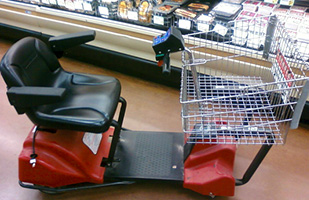Grocer Not Responsible for Motorized Cart Collision that Injured Shopper

Court finds grocery not responsible for injuries customer suffered in motorized cart accident.

Court finds grocery not responsible for injuries customer suffered in motorized cart accident.
A woman shopping at a Brook Park Giant Eagle did not prove that the grocery store chain was legally responsible for the injuries she suffered when another shopper, who was driving a motorized cart, collided with her shopping cart, the Ohio Supreme Court ruled today.
In a unanimous decision, the Supreme Court reversed an award of more than $360,000 in damages to Barbara Rieger that the Eighth District Court of Appeals upheld for the 2012 accident. Rieger claimed that Giant Eagle’s lack of training of its motorized cart users led to the accident.
Writing for the Court, Justice Melody J. Stewart stated that Rieger failed to show that any act or omission on Giant Eagle’s part to train users of the motorized carts caused the accident.
Oral arguments in the case were heard at a special off-site court session in Ashtabula County in April.
Bakery Counter Collision Leads to Lawsuit
Rieger, who died in August, was standing at the Giant Eagle bakery counter when her shopping cart was hit by a store-owned motorized cart driven by Ruth Kurka. As a result of the collision, Rieger was knocked to the ground and taken to the hospital by ambulance.
Rieger incurred $11,500 in medical bills and filed a personal injury lawsuit against Kurka and Giant Eagle. Kurka died prior to the trial, but her estate settled with Rieger for $8,500. At the trial, Kurka’s husband testified that his wife was diagnosed with dementia prior to the incident and that she was never trained to use the cart. However, the jury heard evidence that Kurka had been driving motorized carts for more than a year, drove them on a regular basis, and had no prior accidents.
A Giant Eagle representative testified that the company provides carts for customers with mobility limitations, and assumes the individuals who use them know how to drive them. The representative said there were no operational instructions on the carts at the time of the accident, but the carts contained safety warnings for cart operators to review.
Rieger also presented evidence that 117 incidents involving motorized carts occurred at various Giant Eagle stores from 2004 to 2012.
Before the case was submitted to the jury, Giant Eagle sought a directed verdict, arguing that Rieger failed to prove the store was legally responsible for the injuries. The trial court denied the request, and the jury found the store negligent. The jury awarded Rieger $121,000 in compensatory damages and about $1.2 million in punitive damages.
Giant Eagle appealed the decision to the Eighth District, which affirmed the jury verdict but reduced the punitive damages to $242,000. The store appealed to the Supreme Court.
Court Examines Cause of Accident
In order to prevail on a negligence claim, Reiger had to provide evidence that any act or failure to act by Giant Eagle caused the accident. Justice Stewart explained that causation was neither proven by Rieger nor found by the court of appeals. Evidence of dissimilar motorized cart accidents that occurred on corporate property over the course of several years did not establish causation in Rieger’s case, and without some evidence of causation, the case should not have been submitted to the jury.
Rieger argued the lack of training the grocer provides to its customers led to Kurka’s cart ramming into Rieger’s cart and that the store should have ascertained whether customers with dementia were using them.
The Court explained that causation is established by a “but for” test, meaning the harm Rieger suffered would not have happened “but for” Giant Eagle’s actions or failure to act.
“It is not enough for the plaintiff to assert or speculate that the defendant's actions or failure to act might have caused the injury,” the opinion stated.
Rieger had to prove that Giant Eagle’s failure to provide Kurka with instructions or training on how to operate a motorized cart caused the injuries, and the Eighth District’s opinion does not address that, the Supreme Court stated. While Rieger raised the issue that 117 incidents with motorized carts occurred, she provided no evidence that the incidents occurred because of a lack of instruction and training on how to operate the carts.
Grocer Not Liable for Allowing Cart Use
Rieger also argued that Giant Eagle was liable for “negligent entrustment” because the store allowed Kurka to use the cart, Kurka was incompetent to operate it, and the store knew or should have known she was unqualified to operate the vehicle.
The Court observed that Kurka’s husband testified his wife used the carts regularly without having an accident, and that Rieger did not present any evidence that Kurka’s dementia made her incompetent to use the cart or that the dementia somehow contributed to the accident.
The Court granted Giant Eagle’s request for a directed verdict.
2018-0883. Rieger v. Giant Eagle, Inc., Slip Opinion No. 2019-Ohio-3745.
 View oral argument video of this case.
View oral argument video of this case.
Please note: Opinion summaries are prepared by the Office of Public Information for the general public and news media. Opinion summaries are not prepared for every opinion, but only for noteworthy cases. Opinion summaries are not to be considered as official headnotes or syllabi of court opinions. The full text of this and other court opinions are available online.
Acrobat Reader is a trademark of Adobe Systems Incorporated.


